大学本科第二学期复合式听写复习(2)
复合式听写常考词汇

复合式听写常考词汇VERBSaccuse acquire adapt adopt advertise affectafford analyze apply appreciate approach approve assist associate challenge charge cite combine comment commit compose concentrate confirm confuse consume cope decay decline define deliverdeny deserve distinguish distribute embarrass emerge endure enforce ensure equip estimate extend exhaust expand explode exploit explore finance forgive fulfill grant guarantee handle haste identify ignore imitate inquire infect inspire install insure interfere interpret invade launchleak neglect negotiate oblige postpone praypredict preserve promote protest purchase pursue qualify quit range rank react recall recommend reflect reform register reject release relieve represent rescue resist resolve respond reveal schedule seek shelter spoil stimulate stuff substitute supply survive suspect threaten tolerate transfer transform transport uncover undergo upset urge witness wrap yieldADJECTIVES & ADVERBSabsolute accurate adequate annual appropriate approximately admirable available awful competent complicated complex constantly conscious considerable considerate continual convenient critical currently definite depressed economical enormous eventually extraordinary extreme favorable fluent frequent fundamental gradual grateful guilty ideal initial intense jealous keen mature maximum merely miserable namely overall passive positive presently rare relevant religious rural sensitive sole properly specific stable sufficient superior temporary tense thirsty tough typical unique urbanvain violentindependent incorrect indirect informal inefficient invisible insufficient incredible incapable impolite impatient illegalNOUNSaccess apology analysis anniversary anxiety authority award accent budget campaign catalog client colleague courage chocolate channel competition convenience decision debate decline efficiency explanation favor feature funeral height image incident issue jungle journal luxury laundry leisure license loan mechanism millionaire mixture origin outcome percentage performance poverty principle principal profit proof purchase purpose quarrel range rank recovery restaurant remark reservation resident resource response routine sample scenery schedule shift solution substance supply surgery survival target temper tragedy technician technique trend tune variety vehicle victim viewpoint violence volunteer welfare weddingDIFFICULT WORDS(适用于六级)【Group 1】abolish abrupt album applaud assert auction authentic bribe bug cling comic commence commute compensate contaminate corruption cripple crucial curriculum deficiency defy depict dignity dilemma diplomatic distract distress enlighten enroll epidemic ethnic facilitate fake famine fluctuate fraud gloomy grief hacker illusion immune insane intensify limp literacy manipulate navigation nightmare optional ornament overwhelm plague reconcile refugee resent restrain revolve riot ritual slogan soar spouse stereotype subtle suicide supervise thrill token transaction trifle undermine weird【Group 2】absurd alien antique bonus boom bracket cherish diagnose facilitate ignite irony mortgage option peer shuttle virtual adolescent authentic chronic deficit deteriorate donate incur municipal paradox refute saturate segregate silicon simulate solitary spectrum stereotype subsidy sue therapy trait transaction versus vulnerable。
大学英语四级题型之复合式听写应试技巧
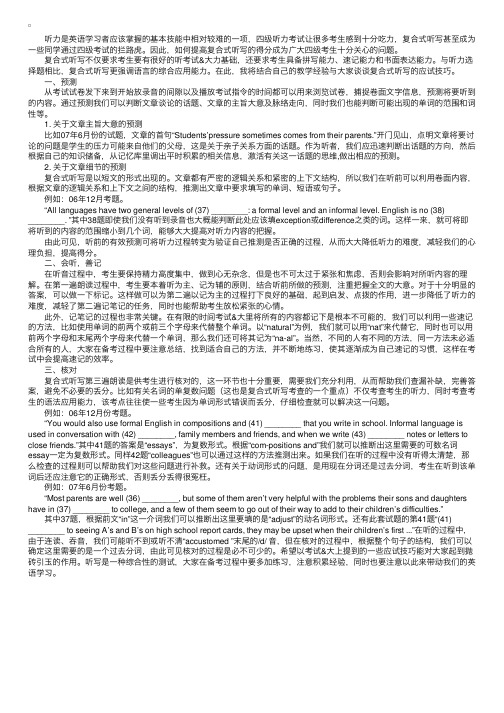
听⼒是英语学习者应该掌握的基本技能中相对较难的⼀项,四级听⼒考试让很多考⽣感到⼗分吃⼒,复合式听写甚⾄成为⼀些同学通过四级考试的拦路虎。
因此,如何提⾼复合式听写的得分成为⼴⼤四级考⽣⼗分关⼼的问题。
复合式听写不仅要求考⽣要有很好的听考试&⼤⼒基础,还要求考⽣具备拼写能⼒、速记能⼒和书⾯表达能⼒。
与听⼒选择题相⽐,复合式听写更强调语⾔的综合应⽤能⼒。
在此,我将结合⾃⼰的教学经验与⼤家谈谈复合式听写的应试技巧。
⼀、预测 从考试试卷发下来到开始放录⾳的间隙以及播放考试指令的时间都可以⽤来浏览试卷,捕捉卷⾯⽂字信息,预测将要听到的内容。
通过预测我们可以判断⽂章谈论的话题、⽂章的主旨⼤意及脉络⾛向,同时我们也能判断可能出现的单词的范围和词性等。
1. 关于⽂章主旨⼤意的预测 ⽐如07年6⽉份的试题,⽂章的⾸句“Students’pressure sometimes comes from their parents.”开门见⼭,点明⽂章将要讨论的问题是学⽣的压⼒可能来⾃他们的⽗母,这是关于亲⼦关系⽅⾯的话题。
作为听者,我们应迅速判断出话题的⽅向,然后根据⾃⼰的知识储备,从记忆库⾥调出平时积累的相关信息,激活有关这⼀话题的思维,做出相应的预测。
2. 关于⽂章细节的预测 复合式听写是以短⽂的形式出现的。
⽂章都有严密的逻辑关系和紧密的上下⽂结构,所以我们在听前可以利⽤卷⾯内容,根据⽂章的逻辑关系和上下⽂之间的结构,推测出⽂章中要求填写的单词、短语或句⼦。
例如:06年12⽉考题。
“All languages have two general levels of (37) ________: a formal level and an informal level. English is no (38)________. ”其中38题即使我们没有听到录⾳也⼤概能判断此处应该填exception或difference之类的词。
复合式听写

“复合式听写”是一种综合性的语言技能,包括听、写、单词量、语法结构、篇章理解、记忆力等各方面的能力。
它是新四级听力考试的必考题型,占听力比重的10%。
从历年的考题来看,“复合式听写”文章的难度呈逐年增加的趋势,而且内容和题材正朝着一个更广阔、复杂的方向发展,这对考生提出了极大的挑战。
考生只有不断熟悉题型,了解出题思路,掌握解题技巧,把握解题步骤,才能达到最佳解题效果。
一、熟悉考试题型“复合式听写”包括两部分:第一部分是听写单词,有八个空格,要求填入“exact words”,每空一词,每词0.5 分;第二部分是表达,有三处较长的空缺,每一空缺填两句左右,每空2 分,如不能完全听写出原句,只写出要点亦可得分。
“复合式听写”全文是一篇250 个词左右的短文,朗读三遍。
第一遍是全文朗读,没有停顿,要求考生注意听懂全文内容。
第二遍朗读时,在36 至43 的每个空格之后略有停顿,让考生填入所缺单词;在44 至46 的每个空格后停顿较长,让考生准确填入所听到的内容或写出其主要意思。
第三遍朗读时没有停顿,供考生进行核对。
考试时间约为15 分钟。
二、了解出题思路(一)了解考查要点“复合式听写”部分主要考查考生辨析同音词和近音词的能力、理解记忆力,以及对单词搭配的掌握程度,对主谓一致、动词时态和名词的单复数等细节熟悉程度,以及根据所听内容进行归纳、总结的能力等。
就前面八个单词填空来说,以形容词、副词等修饰词和动词、名词、连词为主,而后三题考查考生对较长句子语义连贯性的理解,因此以复合句居多。
(二)了解题材类型“复合式听写”主要考查考生的听力理解能力和书面表达能力,以及上文所述等一些能力。
题材类型主要有以下几种:一是评论性或论述性的文章。
“复合式听写”短文一般以评论性或论述性的文章居多,大都反映社会的热点问题,如文化教育、气候变化、环境污染、就业问题、经济危机、能源短缺等。
考生在阅读此类文章时,要特别注意文章的起始句和结束语,因为抓住了这些关键句,也就掌握了文章的中心思想,在听写时就更加容易结合上下文进行推断和预测。
复合式听写听第一二遍的技巧
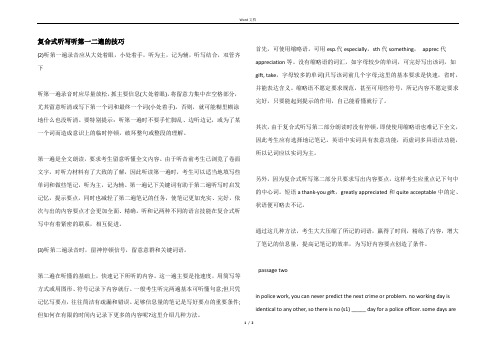
复合式听写听第一二遍的技巧(2)听第一遍录音应从大处着眼,小处着手,听为主,记为辅,听写结合,双管齐下听第一遍录音时应尽量放松,抓主要信息(大处着眼),将留意力集中在空格部分,尤其留意听清或写下第一个词和最终一个词(小处着手)。
否则,就可能糊里糊涂地什么也没听清。
要特别提示:听第一遍时不要手忙脚乱、边听边记,或为了某一个词而造成意识上的临时停顿,破坏整句或整段的理解。
第一遍是全文朗读,要求考生留意听懂全文内容。
由于听音前考生已浏览了卷面文字,对听力材料有了大致的了解,因此听读第一遍时,考生可以适当地填写些单词和做些笔记,听为主,记为辅。
第一遍记下关键词有助于第二遍听写时启发记忆,提示要点,同时也减轻了第二遍笔记的任务,使笔记更加充实、完好,依次与出的内容要点才会更加全面、精确。
听和记两种不同的语言技能在复合式听写中有着紧密的联系,相互促进。
(3)听第二遍录音时,留神停顿信号,留意意群和关键词语。
第二遍在听懂的基础上,快速记下所听的内容。
这一遍主要是抢速度,用简写等方式或用图形、符号记录下内容就行。
一般考生听完两遍基本可听懂句意;但只凭记忆写要点,往往简洁有疏漏和错误。
足够信息量的笔记是写好要点的重要条件;但如何在有限的时间内记录下更多的内容呢?这里介绍几种方法。
首先,可使用缩略语。
可用esp.代especially,sth代something,apprec代appreciation等。
没有缩略语的词汇,如字母较少的单词,可完好写出该词,如gift, take,字母较多的单词(只写该词前几个字母;这里的基本要求是快速,省时,并能表达含义。
缩略语不愿定要求规范,甚至可用些符号,所记内容不愿定要求完好,只要能起到提示的作用,自己能看懂就行了。
其次,由于复合式听写第二部分朗读时没有停顿,即使使用缩略语也难记下全文,因此考生应有选择地记笔记。
英语中实词具有表意功能,而虚词多具语法功能,所以记词应以实词为主。
复合式听写做题技巧
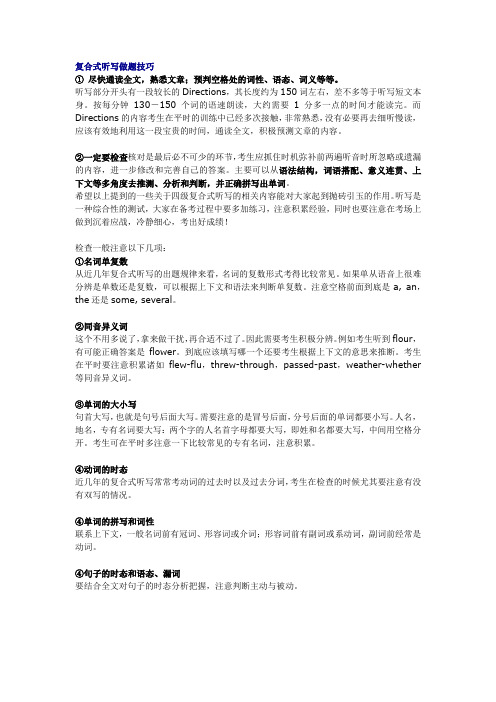
复合式听写做题技巧①尽快通读全文,熟悉文章;预判空格处的词性、语态、词义等等。
听写部分开头有一段较长的Directions,其长度约为150词左右,差不多等于听写短文本身。
按每分钟130-150个词的语速朗读,大约需要1分多一点的时间才能读完。
而Directions的内容考生在平时的训练中已经多次接触,非常熟悉,没有必要再去细听慢读,应该有效地利用这一段宝贵的时间,通读全文,积极预测文章的内容。
②一定要检查核对是最后必不可少的环节,考生应抓住时机弥补前两遍听音时所忽略或遗漏的内容,进一步修改和完善自己的答案。
主要可以从语法结构,词语搭配、意义连贯、上下文等多角度去推测、分析和判断,并正确拼写出单词。
希望以上提到的一些关于四级复合式听写的相关内容能对大家起到抛砖引玉的作用。
听写是一种综合性的测试,大家在备考过程中要多加练习,注意积累经验,同时也要注意在考场上做到沉着应战,冷静细心,考出好成绩!检查一般注意以下几项:①名词单复数从近几年复合式听写的出题规律来看,名词的复数形式考得比较常见。
如果单从语音上很难分辨是单数还是复数,可以根据上下文和语法来判断单复数。
注意空格前面到底是a, an,the还是some, several。
②同音异义词这个不用多说了,拿来做干扰,再合适不过了。
因此需要考生积极分辨。
例如考生听到flour,有可能正确答案是flower。
到底应该填写哪一个还要考生根据上下文的意思来推断。
考生在平时要注意积累诸如flew-flu,threw-through,passed-past,weather-whether 等同音异义词。
③单词的大小写句首大写,也就是句号后面大写。
需要注意的是冒号后面,分号后面的单词都要小写。
人名,地名,专有名词要大写:两个字的人名首字母都要大写,即姓和名都要大写,中间用空格分开。
考生可在平时多注意一下比较常见的专有名词,注意积累。
④动词的时态近几年的复合式听写常常考动词的过去时以及过去分词,考生在检查的时候尤其要注意有没有双写的情况。
听力复合式听写PPT教学课件

2020/1ห้องสมุดไป่ตู้/11
8
2.复合式听写考点分析
2)句子听写的难点
复合式听写的句子部分仍为3句, 长度仍然没有超过25词,样卷 中最长一句为23词,而最短一 句为16词,可以说与以往考试 相仿,但句子本身难度有所提 升,当然,这与文章本身难度 的提升是不可分割的。
than 记作 “<” equal to 记作 “=”等等 4. 混合记忆,夹杂中文。
2020/12/11
14
3.复合式听写策略与技巧
4. 检查、核对内容要点
1.检查漏词 2.检查大小写 3.检查名词单复数, 4. 动词时态,语态 ,非谓语动词 5. 形容词的拼写 6. 副词是否少了ly
2020/12/11
4
1.复合式听写概述
复合式听写的体裁一般为记叙 文和说明文,从历年真题来看, 说明文所占比例最大。复合式 听写的题材主要涉及英、美国 家的文化教育、人文环境、科 普知识以及任务、故事等。
2020/12/11
5
2.复合式听写考点分析
1)单词容易出错的地方:
a.大小写问题:专有名词,句子开头 b.单词各音节间的辅音字母注意是否
2020/12/11
16
Abundant accelerate accompany accommodation accumulate advertise anniversary purchase refrigerator anticipate
Appetite appreciate appropriate architecture authority beneficial boundary athlete bargain boost budget cancel capacity category ceremony characteristic challenge circumstances classical collapse comedy commercial competition comprehensive concentrate consequence considerate contemporary contribute convenience
学习指导_ 如何做复合式听写
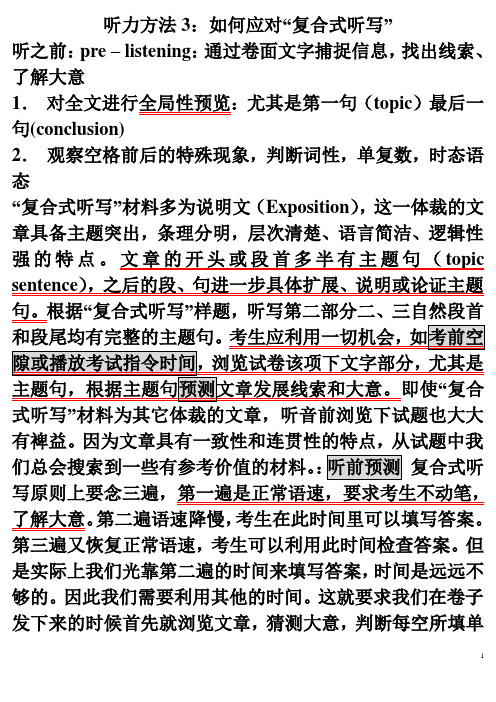
听力方法3:如何应对“复合式听写”听之前:pre – listening:通过卷面文字捕捉信息,找出线索、了解大意1.对全文进行全局性预览:尤其是第一句(topic)最后一句(conclusion)2.观察空格前后的特殊现象,判断词性,单复数,时态语态“复合式听写”材料多为说明文(Exposition),这一体裁的文章具备主题突出,条理分明,层次清楚、语言简洁、逻辑性强的特点。
文章的开头或段首多半有主题句(topic sentence),之后的段、句进一步具体扩展、说明或论证主题式听写”材料为其它体裁的文章,听音前浏览下试题也大大有裨益。
因为文章具有一致性和连贯性的特点,从试题中我们总会搜索到一些有参考价值的材料。
复合式听写原则上要念三遍,第一遍是正常语速,要求考生不动笔,了解大意。
第二遍语速降慢,考生在此时间里可以填写答案。
第三遍又恢复正常语速,考生可以利用此时间检查答案。
但是实际上我们光靠第二遍的时间来填写答案,时间是远远不够的。
因此我们需要利用其他的时间。
这就要求我们在卷子发下来的时候首先就浏览文章,猜测大意,判断每空所填单词的词性。
首先,关于复合式听写你必须明确的几点:1、共十个空。
占10%的分数比例(新题型中分值为10%×710=71分)2、前八空为单个单词填写,必须写下听到的准确形式,即听到什么写什么。
得分,每空0.5分,共4分。
3、后三空为句子填写。
请注意,此时,你既可以听到什么写下什么,也可以按照自己的话将要点写下来。
后三空的分数设置为:2分、2分和2分。
4、从文体类型上看,97年为故事,98年为人物传记,01以后全部为说明文,难度在增加。
5、需要提醒,听写部分得满分的几率和写作得满分的几率一样低。
那么,如何去应对复合式听写呢?听之时:while - listening原则:精听,速记,以听为主,以记为辅。
如何速记1.省略虚词如:如冠词,助动词等2.遇到词组记每个单词首字母如break down 就记作B D ,但一定要自己看得懂的3.长单词记前三个字母如:experience 就记作exp 4.符号记忆如:more than 就记作”>” less than 记作“<” equal to 记作“=”等等5.混合记忆就是把上面几种方法混合起来用,还可以夹杂中文字等等6.随便记忆如果实在一时想不出是什么词,就用拼音,音标或者读音相近的词先把它记下来。
复合式听写高频词汇
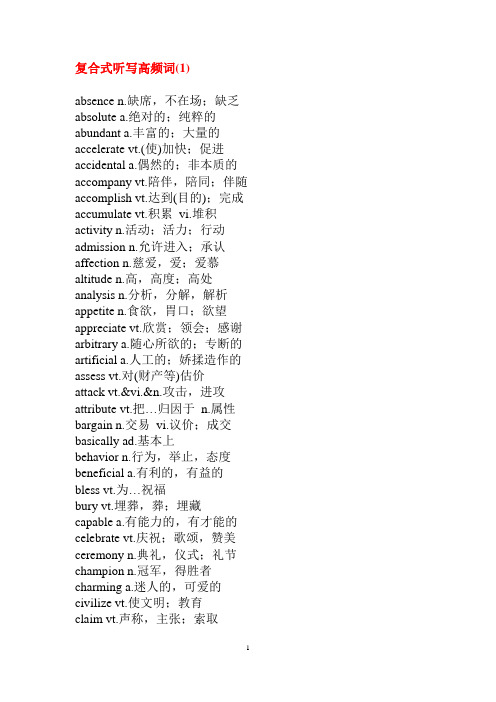
复合式听写高频词(1) absence n.缺席,不在场;缺乏absolute a.绝对的;纯粹的abundant a.丰富的;大量的accelerate vt.(使)加快;促进accidental a.偶然的;非本质的accompany vt.陪伴,陪同;伴随accomplish vt.达到(目的);完成accumulate vt.积累vi.堆积activity n.活动;活力;行动admission n.允许进入;承认affection n.慈爱,爱;爱慕altitude n.高,高度;高处analysis n.分析,分解,解析appetite n.食欲,胃口;欲望appreciate vt.欣赏;领会;感谢arbitrary a.随心所欲的;专断的artificial a.人工的;娇揉造作的assess vt.对(财产等)估价attack vt.&vi.&n.攻击,进攻attribute vt.把…归因于n.属性bargain n.交易vi.议价;成交basically ad.基本上behavior n.行为,举止,态度beneficial a.有利的,有益的bless vt.为…祝福bury vt.埋葬,葬;埋藏capable a.有能力的,有才能的celebrate vt.庆祝;歌颂,赞美ceremony n.典礼,仪式;礼节champion n.冠军,得胜者charming a.迷人的,可爱的civilize vt.使文明;教育claim vt.声称,主张;索取collapse vi.倒坍;崩溃,瓦解collision n.碰撞;冲突combine vt.使结合;兼有companion n.同伴;共事者;伴侣competent a.有能力的;应该做的complicate vt.使复杂;使陷入compromise n.妥协,和解conquest n.攻取,征服;克服conscience n.良心,道德心conscious a.意识到的;有意的contemporary a.当代的,同时代的corresponding a.相应的;符合的critical a.决定性的;批评的cultivate vt.耕;种植;培养curious a.好奇的;稀奇古怪的debate n.&vi.争论,辩论decent a.正派的;体面的decorate vt.装饰,装璜,修饰defeat vt.战胜,击败;挫败definitely ad.一定地,明确地demonstrate vt.说明;论证;表露destruction n.破坏,毁灭,消灭determination n.决心;决定;确定dictate vt.&vi.口授;命令discharge vt.释放;排出n.释放discipline n.纪律;训练vt.训练disguise vi.隐瞒,掩埋n.假装disposal n.丢掉,处理,销毁dramatic a.引人注目的,戏剧的evidence n.根据;证据,证人exposure n.暴露;揭露;曝光facility n.设备;容易;便利faithful a.忠诚的;如实的feasible a.可行的;可能的feast n.盛宴,筵席;节日fiction n.小说;虚构,杜撰flexible a.易弯曲的;灵活的flourish vi.繁荣,茂盛,兴旺fluent a.流利的,流畅的fortunate a.幸运的,侥幸的gallery n.长廊,游廊;画廊genuine a.真的;真正的glorious a.光荣的;壮丽的graceful a.优美的,优雅的gratitude a.感激,感谢,感恩guarantee n.保证;担保物guilty a.内疚的;有罪的habitual a.习惯性的,惯常的harmony n.调合,协调,和谐holy a.神圣的;圣洁的hostile a.敌方的;不友善的ignore vt.不顾,不理,忽视immigrant n.移民a.移民的impact n.影响,作用;冲击implication n.含义,暗示,暗指impressive a.给人印象深刻的independence n.独立,自主,自立indispensable a.必不可少的,必需的inefficient a.效率低的,无能的inevitable a.不可避免的,必然的inspect vt.检查,审查;检阅instantly ad.立即,即刻intellectual n.知识分子a.智力的intention n.意图,意向,目的intimate a.亲密的;个人的investment n.投资,投资额,投入justify vt.证明…是正当的jealous a.妒忌的;猜疑的legal a.法律的;合法的liberty n.自由;释放;许可loyalty n.忠诚,忠心magnificent n.壮丽的;华丽的maintain vt.维持;赡养;维修marvelous a.奇迹般的;了不起的memorial a.纪念的;记忆的miserable a.痛苦的,悲惨的modest a.有节制的;谦虚的motive n.动机,目的mysterious a.神秘的;难以理解的neutral a.中立的;中性的oblige vt.迫使;施恩惠于occupy vt.占领;占,占有opposite a.对面的n.对立物ownership n.所有(权),所有制participate vi.参与,参加;分享passion n.激情,热情;爱好passive a.被动的;消极的pension n.抚恤金,年金permanent a.永久的,持久的plastic a.可塑的n.塑料plentiful a.丰富的,富裕的poisonous a.有毒的,有害的possession n.有,所有;占有物potential a.潜在的n.潜力poverty n.贫穷,贫困precious a.珍贵的,宝贵的precise a.精确的,准确的preserve vt.保护;保存;腌渍procedure n.程序;手续;过程prohibit vt.禁止,阻止promote vt.促进,发扬;提升prospect n.展望;前景,前程province n.省;领域,部门punctual a.严守时刻的;准时的qualify vt.使具有资格rational a.理性的;出于理性的reaction n.反应;反作用reality n.现实;真实reference n.参考;出处;提及reform vt.&n.改革,改良regulation n.规则,规章;管理relativity n.相关性;相对性relieve vt.减轻,解除;救济religion n.宗教;宗教信仰reluctant a.不愿的,勉强的reproduce vt.&vi.繁殖,生殖reputation n.名誉,名声;好名声resignation n.放弃,辞职,反抗resolve vt.解决;决心n.决心respectful a.恭敬的,尊重的respective 各自的,各个的responsibility n.责任;职责ridiculous a.荒谬的,可笑的robbery n.抢劫,劫掠,盗取routine n.例行公事a.日常的rural a.农村的,田园的security n.安全,安全感sensitive a.敏感的;灵敏的severe a.严格的;严厉的significant n.有意义的;重要的similarly ad.类似地,相似地social a.社会的;社交的spiritual a.精神的,心灵的statement n.陈述,声明steadily ad.稳定地,不变地stimulate vt.刺激,激励,激发strictly ad.严格地,严谨地structural a.结构的,构造的submit vt.使服从vi.服从sufficient a.足够的,充分的superior a.较高的;优越的suspicion n.怀疑,疑心,猜疑technique n.技术,技巧;技能tedious a.冗长乏味的,沉闷的temptation n.诱惑,引诱tendency n.趋向,趋势,倾向traditional a.传统的,惯例的tragedy n.悲剧;惨事,惨案treasure n.财富;珍宝vt.珍视tremendous a.极大的,非常的urgent a.紧急的;强求的vacant a.空的;未被占用的valid a.有效的;正当的variety n.多样化;种类;变种verify vt.证实,查证;证明victory n.胜利,战胜welfare n.幸福,福利widespread a.分布广的,普遍的wisdom n.智慧,才智;名言yield vt.&vi.出产n.产量youthful a.年轻的,青年的zealous a.热心的,热情的zone n.地区,区域,范围。
- 1、下载文档前请自行甄别文档内容的完整性,平台不提供额外的编辑、内容补充、找答案等附加服务。
- 2、"仅部分预览"的文档,不可在线预览部分如存在完整性等问题,可反馈申请退款(可完整预览的文档不适用该条件!)。
- 3、如文档侵犯您的权益,请联系客服反馈,我们会尽快为您处理(人工客服工作时间:9:00-18:30)。
1.In a world as fast-changing and full of information as our own, every one of us needs to know how to learn well. Yet evidence suggests that most of us don't use the learning techniques that science has proved most effective. Worse, research finds that learning strategies we do commonly employ, like rereading and highlighting (突出标示), are among the least effective. Although highlighting and underlining are common practices, studies show they offer no benefit beyond simply reading the text. Some research even indicates that highlighting can get in the way of learning; because it draws attention to individual facts, it may interfere with the process of making connections and drawing inferences (推断). Nearly as bad is the practice of rereading, a common exercise that is much less effective than some of the better techniques you can use. Lastly, summarizing, or writing down the main points contained in a text, can be useful for those who are skilled at it, but it is also rated as being of low utility as there are far better ways to spend your study time. In contrast to familiar practices like highlighting and rereading, the learning techniques with the most evidence to support them aren't well known outside the laboratory. Take distributed practice, for example. This technique involves spreading out your study time, rather than engaging in one marathon (马拉松). Rote (死记硬背) at the last minute may allow you to get through that test or meeting, but the material will quicklydisappear from memory. It's much more effective to dip into the material at intervals over time.2.I have never been able to understand people who don't see the point in traveling. The common reason is that traveling is a waste of time and money. I've heard some are scared to travel too far away. I can't help, but feel sorry particularly for those who perceive the experience of seeing a new place as a 100 percent negative one. Telling them stories about unusual encounters doesn't result in the expected curiosity but a "Why would you wanna go there?" It makes me lose faith in humanity. Experience is the best teacher and knowledge is power. The things traveling can teach you are beautiful because you learn to trust in what you see rather than what you are told. It is Mark Twain who said, "Travel is fatal (致命的) to prejudice , bigotry (偏执) and narrow-mindedness," which in my mind goes down as the closest to the truth about traveling. Too bad there aren't enough people with the means to travel actually doing it. If you have the means to go abroad, you should do it despite going out of your comfort zone. You might realize why you love it once you're back home. I think traveling is also the best thing you could do if you feel depressed at home, don't know what to do with your future, your life, your partner, or anything. Once you are away, preferably somewhere very new and unknown, you are forced to adapt and meet people. This works especially if you travel alone. A new life andespecially the new relationships you build, even if only for a short period of time, reveal opportunities and views you never would have thought of and had otherwise.3.People have always been interested in the lives of the wealthy and famous, but in recent years that interest has developed into widespread obsession (沉迷). Is this a good thing? It's definitely not a good thing when the celebrity concerned is doing nothing but set a bad example. Celebrities and those in the public eye have a responsibility which few appear to acknowledge. Their behavior, the way they dress, the way they conduct themselves when out on the town, the cars they drive and the places they go on holiday are all seen by fans and followers as goals worth pursuing. It's therefore not surprising that so many young people routinely use illegal substances, drink too much, are preoccupied with their appearances and care so little for the environment. I'm reminded that celebrities are people too. They are subject to the temptations the anxieties and mental strain that everyone has to bear. But I think that it is high time that celebrities woke up to their responsibilities. If they want to be applauded for their work they must assume responsibility for the role model that they provide. Many celebrities are guilty of setting bad examples at one time or another. When will these people become aware of the fact that whatever they do will be copied by countless hundreds,thousands, even millions of people? While most people are sensible enough not to be overly influenced by such stories there are plenty who will hear these tales and see them as a green light. They'll believe that it is perfectly OK to drive an environment killing car at breakneck speed on public roads because some thoughtless, selfish celebrity has bragged (吹嘘) about doing it.4.Changes in how universities and research institutions are funded have meant that there are fewer permanent, full-time posts available. In addition to the reduction in the number of posts, the perceived value of having a career in higher education has changed over the last 30 years. In the past, an individual who was intelligent, hard-working, and got along with their colleagues, would start with a PhD and then move into teaching and lecturing, with the ultimate goal of becoming a professor in a university or research institute. While the career path is no longer that smooth, there are still options for those who are committed a career in academia (学术界). One way is to embrace and pursue a career as a global researcher, operating in an international context. For those who are building an international reputation, there is also the option of becoming an intellectual who is active in the public eye. For academics who want neither of the above, one feasible career move is to cross over into higher education management, which were traditionally the preserve ofacademics nearing the end of their career. Whichever career path an individual takes, wider changes will have a number of implications for individual lifestyles and relationships. Eventually, academics will need to go where the money is. They are likely to end up taking on a number of part-time contracts at different institutions at the same time, or temporary contracts one after another. This means that they will find less stability in their working lives. This can lead to frustrations rooted in the challenges of striking a balance between the need for a career and the need for a stable personal life.。
